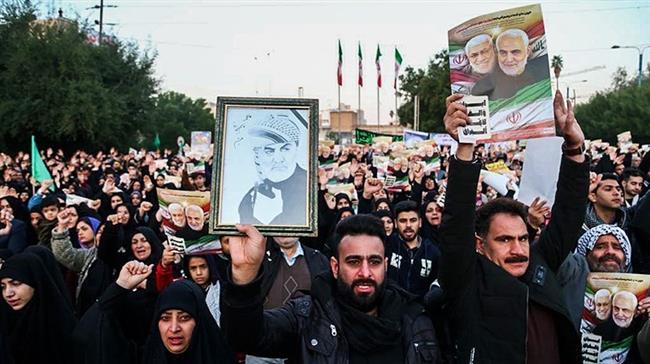The US "aggressive" act in assassinating a senior Iranian commander and deputy chief of Iraqís Hashd al-Shaíabi forces will give rise to anti-American sentiment across the Arab country, say political analysts.

The Iranian commander General Qassem Soleimani and his Iraqi anti-terror comrade, Abu Mahdi al-Muhandis were assassinated in the drone strike outside Baghdad airport on Friday.
"The narrative of anti-Americanism is coming back," Renad Mansour of the London-based Chatham House told Agence France-Presse.
The belligerent measure has opened the door to fierce criticism of the US, harkening back to the years following the American invasion of Iraq in 2003, which led to the fall of former dictator Saddam Hussein.
"America hasnít done something this aggressive in a while, so it has brought back memories of the American military occupation of Iraq, as well as the same language and discourse," Mansour said.
Iraqís premier, Adel Abdul-Mahdi, condemned the strike as a violation of Iraqi sovereignty and of the US militaryís mandate in the country.
Around 5,200 American forces are deployed across Iraq where various groups had for months been urging parliament to revoke the bilateral agreement allowing US troops in Iraq, and Mansour said the strike could bolster their argument.
Indeed, top officials in the Hashd al-Shaíabi, a network of popular anti-terror groups incorporated into the state, swiftly began calling for the departure of US forces.
Leading Hashd member Hadi al-Ameri urged lawmakers "to take a bold decision to oust foreign troops from Iraq, because their presence has become a threat for Iraqis."
Major cleric Moqtada Sadr swiftly reactivated his Mahdi Army, the militia that fought US troops after the invasion but which was dissolved nearly a decade ago.
Qais al-Khazali, a US-sanctioned leader of a popular anti-terror group, also called on his fighters to "be ready" following the strike.
And Kataíeb Hezbollah predicted that the terrorist American attack would ring in "the beginning of the end for the US presence in Iraq and the region."
Less than a week earlier, the US had killed nearly three dozen Kataíeb Hezbollah fighters in terrorist bombings for the alleged death of an American contractor in northern Iraq.
In response, streams of Hashd supporters and Iraqis of all faiths and communities laid siege to the US embassy in Baghdad this week.
Prominent Iraqi figures, including top cleric Grand Ayatollah Ali al-Sistani and President Barham Saleh, condemned the strike publicly.
"Some think todayís hit clips Iranís wings in Iraq. The opposite is more likely," wrote Fanar Haddad of Singapore Universityís Middle East Center.
"Iraqi political classes are likely to align more strongly with Iran due to compulsory solidarity and some indignation," he said.
Analyst Nick Heras said targeting the Hashd could have "significant ramifications" for US-Iraqi ties.
"It means that the United States is engaged in a conflict with a component of the state-sanctioned Iraqi security forces," he warned.
Anti-terror groups "now have a political and government wing, media outlets, money, relations, experience, arms, human resources and a supportive public," said specialist Hisham al-Hashemi.
As a result, Washington felt it was "no longer the most powerful actor in Iraq" and sought to regain leverage through the "adventurous policy" of the Soleimani strike, he said.
The US action frustrated traditional allies as it was launched with little coordination or advance warning, according to diplomatic sources in Baghdad.
Iraqís parliament is about to hold an emergency session Sunday, with lawmakers threatening to call for the ouster of US troops.
On Saturday, Al Mayadeen said the two major factions of the Iraqi parliament - Fatah Alliance led by Ameri and Sairoon led by Sadr - had reached consensus on passing legislation that ends the US military presence in the Arab country.
"Iraqis realize that the US isnít a long-term ally -- it neither cares nor matters," said Mansour.
They see a US administration without a cohesive objective while Iranís policy is more fixed.
"There used to be a debate about who has influence, the US or Iran? Now no one is even asking -- Iran has the clear advantage."
LINK: https://www.ansarpress.com/english/12494
TAGS:






























 Violation of the sovereignty and rights of afghan citizens by America
Violation of the sovereignty and rights of afghan citizens by America




